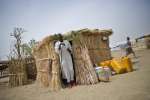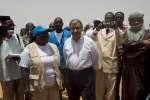Foreword to "The Right to Asylum between Islamic Shari'ah and International Refugee Law: A Comparative Study," by Professor Ahmed Abu Al-Wafa
Setting the Agenda, 26 June 2009
The deeply rooted Arabic traditions and customs have, for a very long time, served as a solid foundation for protecting human beings and preserving their dignity. Notions such as "istijara" (plea for protection), "ijara" (granting protection), "iwaa" (sheltering) and others are variations on the concept of "protection" which is the heart of the mandate conferred on the United Nations High Commissioner for Refugees.
The Islamic Shari'a further consolidated the humanitarian principles of brotherhood, equality and tolerance among human beings. Relieving suffering and assisting, sheltering, and granting safety to the needy, even enemies, are an integral part of Islamic Shari'a, which preceded by many centuries current international human rights treaties and norms, including the right to asylum and the principle of non-refoulement, which are designed to preserve the refugee's life and ensure his or her well-being.
The Islamic Shari'a addressed the issue of asylum explicitly and in detail, and guaranteed safety, dignity and care for the "musta'men" (asylum-seeker). Moreover, Islamic society followed specific procedures in responding to asylum requests. Hence, the return, or refoulement, of the "musta'men" was prohibited by virtue of Shari'a. Today, what is known as non-refoulement constitutes the cornerstone of international refugee law and relies on this very same principle.
More than any other historical source, the Holy Qur'an along with the Sunnah and Hadith of the Prophet of Islam are a foundation of contemporary refugee law.
António Guterres
The custom of "aman" (safety) implies the protection of asylum-seekers, whether they are believers or non-believers. This is clearly stated in Surat "Al-Tawba" (repentance)): "And if anyone of the Mushrikin (polytheists, idolaters, pagans, disbelievers in the Oneness of Allah) seeks your protection, then grant him protection so that he may hear the Word of Allah (the Qur'an), and then escort him to a place where he can be secure, that is because they are men who know not".(Ayah (verse) 6) The "istijara " featured as an overall umbrella for the asylum seeker, his or her family and property, and was particularly associated with holy places, as Surat "Al Baqarah" states: "And when We made the House (the Ka'bah at Makkah) a place of resort for mankind and a place of safety. And take you (people) the Maqam (place) of Ibrahim (Abraham) [or the stone on which Ibrahim (Abraham) stood while he was building the Ka'bah] as and We commanded Ibrahim (Abraham) and Isma'il (Ishmael) that they should purify My house (the Ka'bah at Makkah)) for those who are circumambulating it, or staying (I'tikaf), or bowing or prostrating themselves (there in prayer)".(Ayaha 125). Also, the holy Hadith states, "He who enters the holy mosque is safe, He who enters the house of Abu Sufyan is safe; he who drops his weapon is safe; he who stays behind his closed door is safe". 1
As expressed by many scholars, the migration of Muslims to Abyssinia (Habasha) and the flight of the Prophet, (PBUH), to Medina, to avoid persecution and oppression by the people of Qureish, were acts of mercy. Yet these set an important precedent for the relationship between the asylum-seeker and the asylum provider, whereby the rights of the former are linked to the duties of the latter.
More than any other historical source, the Holy Qur'an along with the Sunnah and Hadith of the Prophet of Islam are a foundation of contemporary refugee law. Even though many of those values were a part of Arab tradition and culture even before Islam, this fact is not always acknowledged today, even in the Arab world. The international community should value this 14-century-old tradition of generosity and hospitality and recognize its contributions to modern law.
In this solid study the author provides a detailed explanation of Islamic Shari'a and Arab customs, including the standards and norms which underpin the legal framework on which the Office of the United Nations High Commissioner for Refugees bases its activities.
The author describes how Islam honoured refugees, even if they were non-Muslims, forbade forcing them to change their beliefs, did not compromise their rights, helped reunite families and guaranteed the protection of their lives and possessions. The author has also collected a number of Qoranic texts and ancient Arabic poetry, dated before and after the appearance of Islam, and provides a thorough explanation of these texts and sources. These are some of the enlightening truths the book unveils about the Arab and Islamic traditions, which consider someone who shelters a migrant a true believer, and which hold the right to asylum as basic and sacred, guaranteeing it also to non-Muslims.
Today, the majority of refugees worldwide are Muslims. This fact occurs at a time when the level of extremism, ethnic and religious, is on the rise around the globe, even in the world's most developed societies. Racism, xenophobia and populist fear-mongering manipulate public opinion and confuse refugees with migrants and even terrorists. These attitudes have also contributed to misperceptions about Islam, and Muslim refugees have paid a heavy price. Let us be clear: refugees are not terrorists, they are first and foremost the victims of terrorism. This book reminds us of our duty to counter such attitudes.
This is also a valuable comparative study on the norms of Islamic Shari'a and international law regarding refugees and asylum, as well as migration and forced displacement. It is the outcome of the continuous and close cooperation between the United Nations High Commissioner for Refugees and Organization of the Islamic Conference.
Of course, what is more important is not theory or the status accorded to a person, but the actual protection provided to him or her, and that is a strong tradition and practice of member-States of the Organization of the Islamic Conference. The fruit of partnership between UNHCR and this Organization can be seen in the Declaration on Human Rights in Islam, adopted in 1990 by the Organization of the Islamic Conference, which stipulates that "every human being… if persecuted, has the right to seek asylum in another country; and the country of asylum shall ensure his protection until he/she has reached safety (aman)."
This book is a valuable reference and should be read by anyone working or interested in human rights, refugees and migration issues. It is also a timely study of the Arab and Islamic values which have served, directly and indirectly, as a reference for many international laws and conventions.
A genuine strategic partnership between UNHCR and the Islamic world is vitally important to the continuation of this 14-century old commitment to generosity, hospitality and non-discriminatory protection. These principles, along with a respect for basic human rights, are explored here in detail and shown to be the foundation for much of the international law that informs humanitarian work. We would do well to remember the Islamic principle that "before all the calamities of the world, all human beings are equal".
António Guterres
UN High Commissioner for Refugees
1 Produced by Muslim in fateh makkah chapter, from kitab al-jihad was-siyar, saheeh al-bukhari 3.-1408 No. 1780, ibn Shaybah and kitab al-maghazi, verified by Dr. Abdul-Aziz al-'Omari, Riyadh, Dar Ishbilia, 1420 AH ( 1990 AD)








































